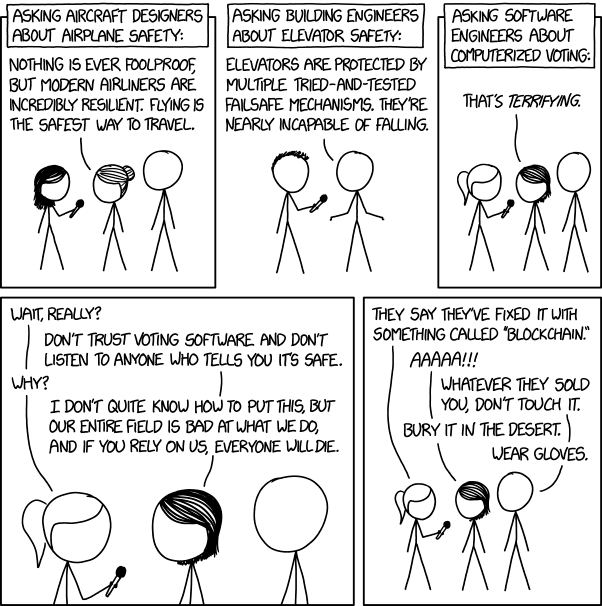Having had my Visa Debit card blocked twice in as many weeks, I’m beginning to question if our current “Plastic” cards are fit for purpose. A somewhat long story follows with a question at the end:
About 2 weeks ago, Skinny decided not to honour my perfectly valid Visa card. I contacted my bank to find out why my card was being rejected. They let me know that some businesses won’t take payment on cards that are approaching expiry and Skinny, apparently, won’t take payment if the card expires in the following month. The card was due to expire in 8 weeks!
I find it ridiculous to reject payments that far from expiry! What would you do if you only had access to one credit card?
I switched cards on the account and in the process the Skinny interface initiated three transactions in quick succession, of which two should not have occurred. Another long story, but it took four hours (yes 4) to sort that out. These transactions triggered my bank to block the newly registered card and warned me via text message. Thankfully, a quick reply text was all that was needed to unblock the card.
My new card arrived a week or two later (they sent it out early) - all good once I used it to make a local purchase via EFTPOS. (This card had the same card number but different CVV)
A little over a week later, I receive a text message from my bank:
We’ve blocked your Visa Debit Card due to some suspicious transactions to Google YouTube Super. If this was you, please reply AUTHORISED. If not, please give us a call on #### or pop into your local branch
These were not my transactions, so a call was made. Apparently, the card number was/had been used on multiple (21) relatively small transactions in Australia. The bank’s only option was to cancel the card and re-issue me a new one. How these transactions were being validated without the CVV (unless they had ‘cracked’ it), I don’t know. These were Google transactions, so I would expect them to have been validated?
Luckily, I was due to travel to town - a little over two hours round trip! So I went into my closest branch and received a new card (with a new card number this time). Another EFTPOS transaction at a local shop and it’s good to go again.
I’ve no doubt there are others who have had similar experiences?
I can’t remember the last time I used cash, though I always carry some. For me, a cashless society mostly works.
The discussion I had with my bank suggests that these type of blocks, due to unauthorised transactions, are on the rise significantly.
So what is the future of “money”? How can transactions be made without inconvenience, but still be secure and safe from unauthorised access?
Really just a topic starter and I felt I needed to tell the story.
From what I hear in China, and possibly some other countries, if they don’t like what you do/say you’re not only censored but they’ll cut you off from your bank. Cash is king and it always will be.
Your bank account is nothing but zeros and ones. Imagine if there was a massive power outage for an extended period of time. It happened here last week, luckily for only a day, but you couldn’t get gas or groceries because there was no power. If they had power, the internet was down so the card machines wouldn’t work.
It’s easy to forget how fragile the whole system is and cash on hand will always be king.
What are folks in places like Gisborne supposed to do when the infrastructure for digital payments goes out in another flood?
2FA would probably be part of the answer: whereby you get a text / app notification with a unique code to confirm a transaction. Not always convenient, I pretty much always sigh when having to use them, but at least significantly harder for people to spoof.
I can imagine a future, not that far off, where physical cards are obsolete, and phones are the primary identifying factor in everyday transactions.
But yeah that whole not honoring transactions from a near(ish) to expiry card thing is total BS. I’d be looking to ditch Skinny if that happened to me.

🛠️ memes aside, I’m a software developer and I don’t trust software-only systems with no fallback. Too many moving parts that can go wrong.
Cashless requires an effective cash substitute, otherwise people who can’t get bank accounts are not able to use money.
These people include but are not limited to:
- newly adult children of “off grid” or religious cult parents who did not register their birth, or whose parents are withholding their vital documents
- people who have lost all their identification in a disruptive life event such as a house fire, flight from a war zone, unexpected incarceration with subsequent loss of home and belongings, or due to activity resulting from untreated mental health conditions
- identity theft victims whose electronic reputation has been destroyed
- victims of bureaucratic error who are officially dead or otherwise tangled in red tape
- immigrants, migrants, and refugees who are not “legal” and who therefore can’t get the documentation they need (regardless what you think of those who skirt immigration laws, this group includes people brought into a country as children, and human trafficking victims and even if it didn’t the punishment for illegal immigration should be deportation, not starving on the streets)
Outside of that, while a cash or cash equivalent economy allows for various criminal and black market economy, it also provides a buffer for targeted minorities or other potential victims if there’s an outbreak of fascist and/or genocidal government.
This is the bulk of why I think we need some form of legal currency that is bearer only.
Monero, it’s the only digital currency that resembles cash.
Cryptocurrency, in all its flavours and colours, is a scam. Don’t buy into that bullshit.
This is a blanket statement that simply isn’t true.
Most crypto is a scam, for sure, but the technology is sound and could easily be implemented for everyday life.
Maybe it theoretically could, but it won’t, because it’s a scam and its entire purpose is to be a scam. That’s why cryptocurrency was invented: to separate people from their actual money.
Not useful to make everyday purchases is it?
I see a lot of comments that a cashless society would not be a good one, but no reasons behind this.
Sure, current implementations and technology make it nonviable, but I cannot think of any reason why this could not change in the future.
Hypothetically, the government’s central bank could issue a crypto-based currency, backed by them, and equal exactly to the dollar. Let’s call it the Kiwicoin. This coin would work using an official wallet, and perhaps other 3rd party wallets. It could be used with a debit-card, like some places already have (crypto.com, wirex, etc). You could exchange fist into this, and back, 1:1 with no fees. Instant transactions, resilient network, complete record of transactions. There are many potential benefits.
This is only one option, I’m sure there are other ways of executing a cashless society. Cash has no intrinsic value, and other than being a physical object, has no benefit over the numbers in your bank, and several downsides.





